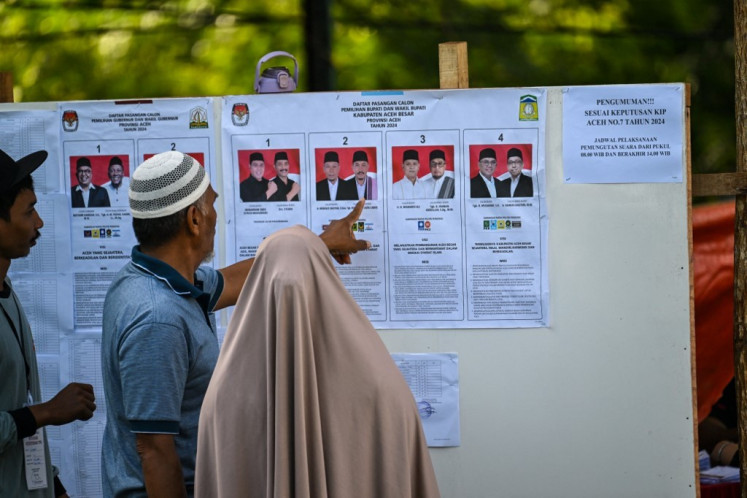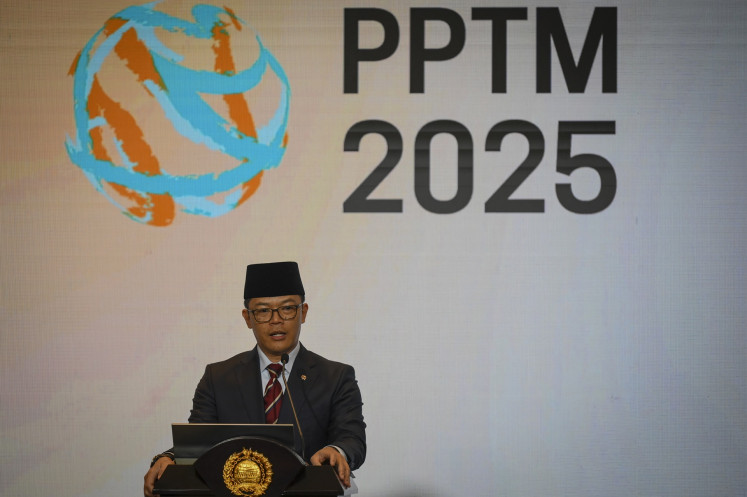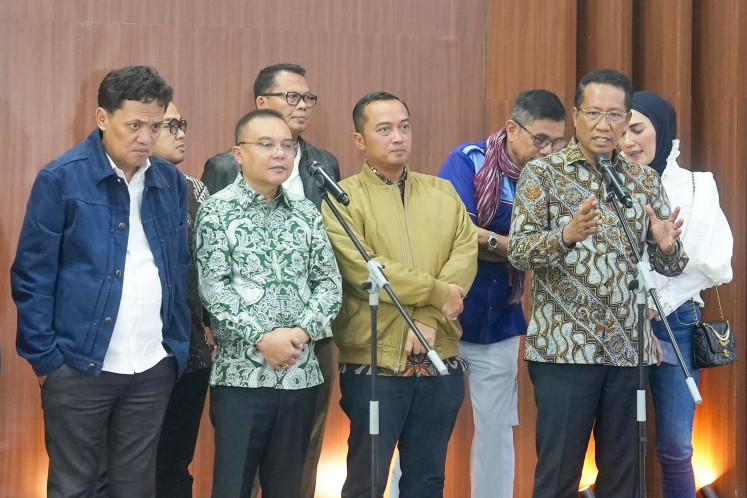Popular Reads
Top Results
Can't find what you're looking for?
View all search resultsPopular Reads
Top Results
Can't find what you're looking for?
View all search resultsGraft cases show need for procurement law: Activists
A preponderance of procurement-related graft cases should prompt the government and the House of Representatives to accelerate the drafting of a bill on procurement, watchdog groups say
Change text size
Gift Premium Articles
to Anyone
A
preponderance of procurement-related graft cases should prompt the government and the House of Representatives to accelerate the drafting of a bill on procurement, watchdog groups say.
The NGOs referred to a recent high-profile bribery case surrounding the contract to build the athletes’ village for the upcoming Southeast Asian Games in Palembang, South Sumatra.
The case confirmed a report by the Corruption Eradication Commission (KPK) that said the majority of government corruption cases — 86 of 196 cases recorded between 2004 and 2010 — were related to the procurement of goods and services.
Agus Salim, the KPK prosecutor for the SEA Games case, said that the case was “a quintessential example of the common method for winning a procurement project in this country”.
The case has implicated four suspects: Youth and Sports Ministry secretary Wafid Muharram, a PT Duta Graha Indah employee Mohammad El Idris, go-between Mindo Rosa Manulang and former Democratic Party treasurer Muhammad Nazaruddin.
A coalition of activists called for a stern law regulating government procurement projects, stating that the current presidential regulation on procurement was weak and made corruption inevitable.
The activists are comprised of members of the Indonesia Transparency Society (MTI), Transparency International Indonesia (TII), the Indonesian Center for Legal and Policy Studies (PSHK), the National Consortium for Legal Reform (KRHN), the Indonesian Legal Roundtable (ILR), the Indonesian Judicial Monitoring Society (Mappi) and the Association for Advocacy and the Study of Independent Justice (LeIP).
Transparency International Indonesia procurement specialist Heni Yulianto told The Jakarta Post on Sunday that the government had to provide for public participation to monitor the procurement process.
“The government must also establish a complaint mechanism to accommodate [complaints] should there be reports from the public,” he added.
The government, however, had yet to listen to the activists’ recommendations on the bill, according to Heni.
He slammed the Government Procurement Regulatory Body (LKPP) for its sluggishness in drafting the bill, despite its inclusion in the House of Representatives’ 2011 legislative agenda (Prolegnas).
Jamil Mubarok from the Indone-sia Transparency Society said the 2010 presidential regulation on procurement was lax. “Law enforcement efforts will be futile without prevention efforts by improving the current system through a legal framework.”
Current procurement procedures are regulated by Presidential Regulation No. 54 on Public Goods and Services Procurement, which replaced a 2003 presidential decree providing guidelines for the government procurement of goods and services.
The activists said there were 15 loopholes in current procurement procedures that were prone to abuse.
“Such loopholes occur at the beginning of the process, the planning stage, until the evaluation stage,” Jamil said. “Violations are systemic and structured in procurement projects that involve powerful actors.”
Jamil said that the presidential regulation failed to provide criminal penalties for illegal behavior.
“The current presidential regulation cannot avoid wasting the state budget because it does not acknowledge the principles of effectiveness and efficiency,” Jamil said, citing the example of the House’s plan to build itself a luxurious office building.
The LKPP previously said that 35 to 40 percent of the state budget went to procure goods and services.
Critics have also said that the presidential regulation was flawed as it continued to allow the direct appointment of contracts without monitoring and auditing.
According to the regulation, direct appointments are allowed for projects valued at less than Rp 100 million (US$11,700) that entailed small risk, were supplied by small businesses or were related to operational needs and used simple technology.










